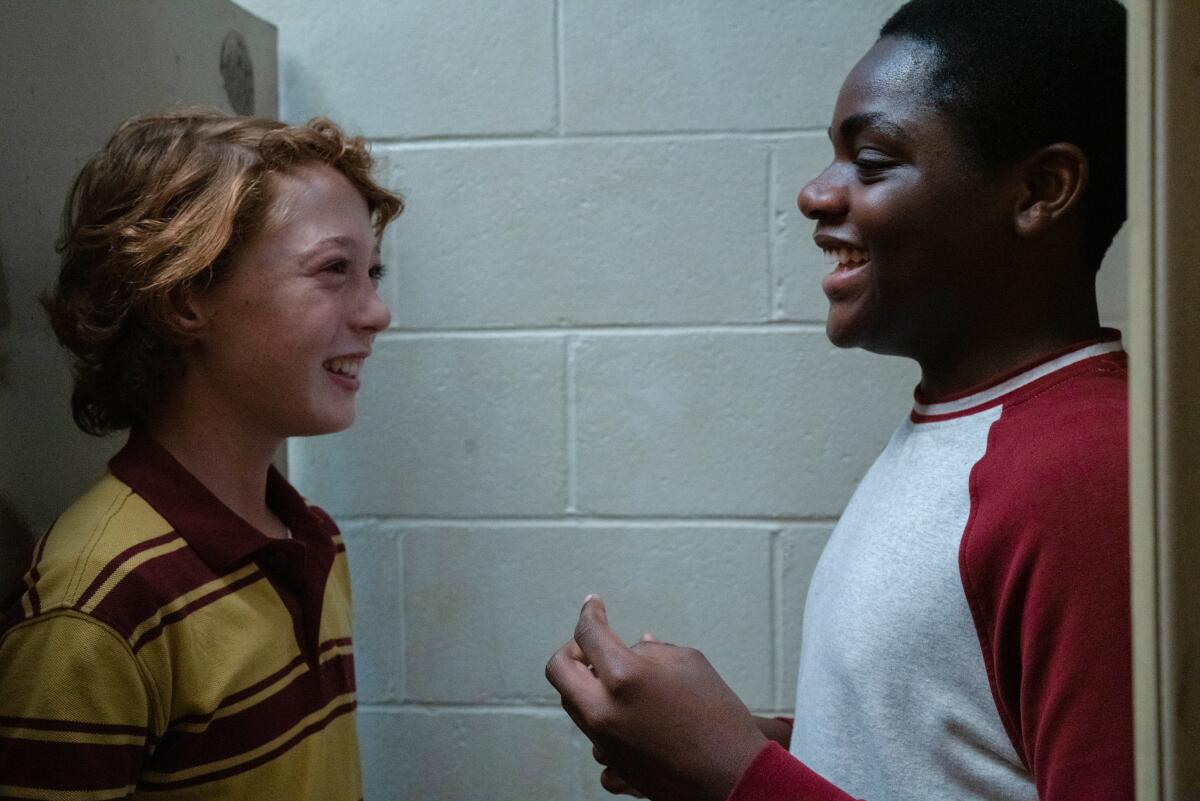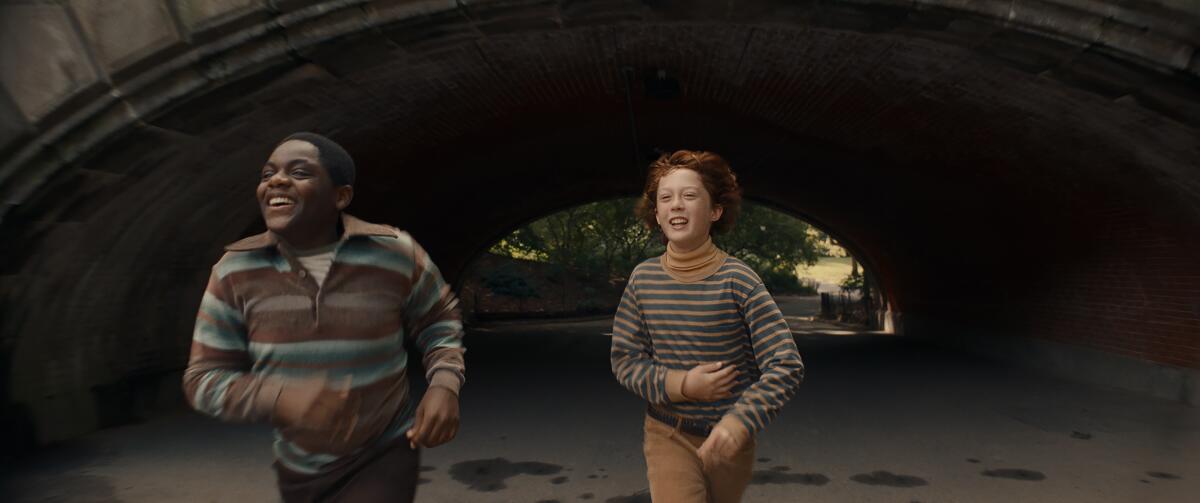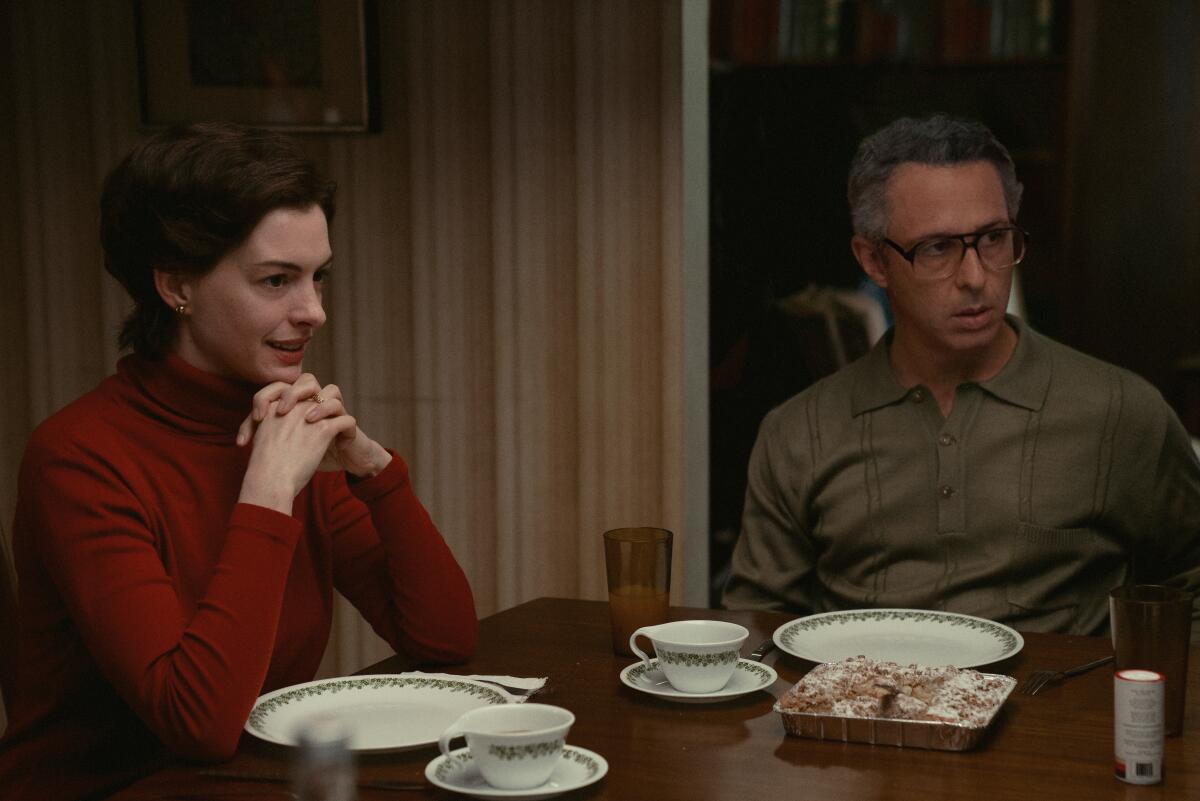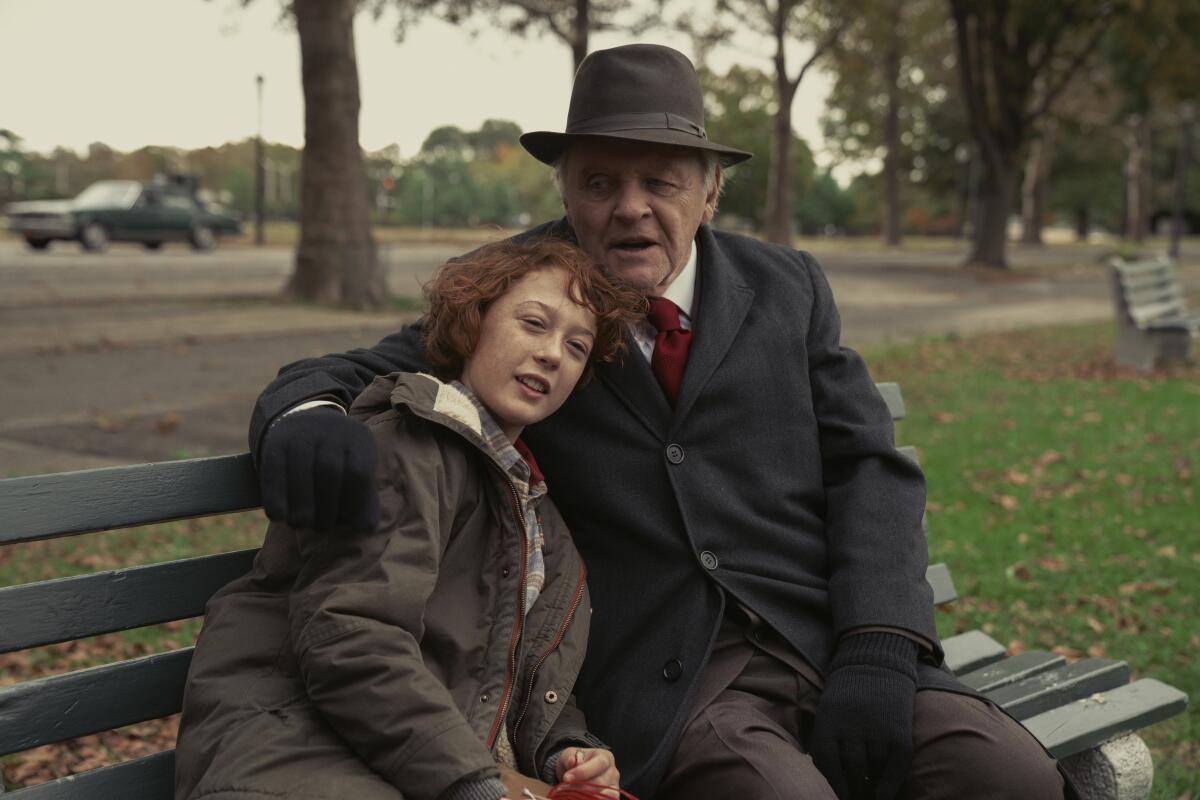- Skip to main content
- Keyboard shortcuts for audio player


Movie Reviews
- LISTEN & FOLLOW
- Apple Podcasts
- Amazon Music
Your support helps make our show possible and unlocks access to our sponsor-free feed.
A director critically reexamines his 1980s childhood in 'Armageddon Time'
Justin Chang

Banks Repeta plays 11-year-old Paul Graff and Anthony Hopkins is his grandfather in Armageddon Time. Anne Joyce/Focus Features hide caption
Banks Repeta plays 11-year-old Paul Graff and Anthony Hopkins is his grandfather in Armageddon Time.
A lot of filmmakers these days seem to be in an intensely personal, self-reflective mood. There's a terrific movie in theaters right now called Aftersun , and it's based on the childhood memories of its first-time director, Charlotte Wells. Several upcoming films, like Steven Spielberg 's The Fabelmans and Bardo , from Alejandro G. Iñárritu, are also drawn from their filmmakers' life experiences.
Armageddon Time , the latest movie written and directed by James Gray, is an especially thoughtful and moving example. While it's a loving re-creation of a time and place Gray knows well — some of it was shot just blocks away from his childhood home in Queens — the director has more than a rosy nostalgia trip in mind. He's made an uncommonly tough-minded movie about race, class, assimilation and white privilege in America. And while it takes place in 1980, a few months before the election of Ronald Reagan, it has nearly as much to say about the present.
The story follows Paul Graff, an 11-year-old version of Gray played by a wide-eyed young actor named Banks Repeta. Paul wants to be an artist when he grows up. He's also a bit of a class clown at his public school, where his best friend is a Black classmate named Johnny, played by Jaylin Webb. They have fun hanging out and goofing off, and they take turns sticking up for each other when they get in trouble, which is often. But as Paul soon notices, it's Johnny who always gets the more severe punishment. He also knows that Johnny is poor and lives with his grandmother.
That places him in stark contrast with Paul and his comfortably middle-class Jewish family. Gray does a wonderful job of immersing us in the everyday bustle of the Graffs' home, where relatives are always coming over for dinner, none more beloved than Paul's grandfather, affectionately played by Anthony Hopkins .
Jeremy Strong is terrific — and very un- Kendall Roy -like — as Paul's father, a plumber with a big heart and a fierce temper. Anne Hathaway does her finest acting in some time as Paul's gentler but more resilient mother. Like any good parents, Paul's mom and dad only want what's best for him. They've worked hard to make a good living and earn a level of social standing in their community. Given their Jewish immigrant roots, they also know the challenges of assimilating into American culture. At extended gatherings, Paul's relatives share grim stories about the anti-Semitic violence their family fled from in Ukraine. But Gray doesn't shy away from exposing their own casual prejudice: We also hear some of those same relatives spout derogatory remarks about Black people around the dinner table.
It's been a while since I've seen a movie that captured family dynamics with this much unsparing honesty. It's also been a while since I've seen a Hollywood movie with such a layered understanding of how white supremacy pits people of different backgrounds against each other. That's a concept that feels painfully resonant now in a moment of heightened anti-Semitism and anti-Black racism. And just to make the present-day parallels obvious, Gray throws in a sharp jab at the Trump family, a major presence at Paul's private school.
At its heart, though, Armageddon Time is about Paul and Johnny's friendship and how that friendship tragically changes. It's here that things get a little tricky: Some might see Johnny as a regrettable stereotype, the Black character who suffers grievously so that his white friend can learn a hard-hitting lesson. But I think that reading may be too easy, partly because the film is all about the limitations of Paul's perspective, and partly because Gray has no interest in dispensing reassurance or uplift. He's made an angry, despairing movie about one boy's disillusionment with the injustice of the world and his own silent complicity with it. What makes Armageddon Time so powerful is that Gray reserves his harshest anger for himself.
Advertisement
Supported by
Critic’s Pick
‘Armageddon Time’ Review: Hard Lessons About Life in America
New York in 1980 is the setting for James Gray’s brooding, bittersweet story of family conflict and interracial friendship.
- Share full article

By A.O. Scott
Can you remember the first day of sixth grade? Would you even want to? James Gray, in the opening scene of “Armageddon Time,” his tender and lacerating new film, brings it all back with clammy precision.
We are at Public School 173 in Queens, New York, at our desks in Mr. Turkeltaub’s class. It’s 1980 — maybe you’re old enough to remember that, too — and two boys are about to get in trouble, one for mouthing off during roll call and the other for drawing a picture of the teacher (Andrew Polk) with the body of a turkey. It seems like if your name was Turkeltaub and you taught sixth grade you might be able to take the joke, but on the other hand, maybe not being able to take the joke is the whole reason you’re teaching sixth grade in the first place. This is a man, after all, whose job requires him to utter the words “gym is a privilege, people” with a straight face.
“Armageddon Time” isn’t about Mr. Turkeltaub, though his contempt for his students helps to propel its plot. It’s not about gym class either, but it is — astutely, uncomfortably and in the end tragically — about privilege.
The two troublemakers — Johnny Davis (Jaylin Webb) and Paul Graff (Banks Repeta) — become friends, bonded by their dislike of Turkey (as they call him when he’s out of earshot) and also by the kind of shared interests that connect boys on the edge of adolescence. For all their rebellious bravado in Turkey’s class, there is still something childlike in the way Johnny and Paul approach the world, and a sweet softness in the mannerisms of the young actors who play them.
Johnny collects NASA mission patches and dreams of becoming an astronaut. Paul thinks the Beatles will get back together soon. He also tells Johnny — matter-of-factly rather than boastfully — that his family is “super rich.” This isn’t quite true. Paul’s father, Irving (Jeremy Strong), is a boiler repairman. His mother, Esther (Anne Hathaway), is a home-economics teacher and P.T.A. officer who is considering a run for the local school board. With help from Esther’s parents (Anthony Hopkins and Tovah Feldshuh), they are sending Paul’s older brother, Ted (Ryan Sell), to private school, where Paul will eventually join him.
In a fairly short time — between the start of school and Thanksgiving, with the election of Ronald Reagan in between — Paul will arrive at a clearer, harsher understanding of how power, status and money work in America, a lesson that will come at Johnny’s expense.
Johnny is Black, Paul is white, and even as they navigate the world together, they experience it in different ways. Mr. Turkeltaub may punish them both, but he is much harder on Johnny, calling him an “animal” and ridiculing him in front of his peers. Johnny, who lives with his grandmother, is one of a small number of Black students at the school, and their presence alarms some of the ostensibly tolerant adults in Paul’s family.
Interracial friendship is an old and complicated theme in American culture. Think of Ishmael and Queequeg bedded down at the Spouter-Inn in “Moby-Dick,” Huck and Jim adrift on the Mississippi in “Huckleberry Finn” or Dylan and Mingus tagging up Brooklyn in Jonathan Lethem’s “The Fortress of Solitude.” In almost every case, the white character’s perception is central (these books are all first-person narratives, and in a palpable if not literal sense, “Armageddon Time” is too). The Black character, however brave, beautiful or tragic he may be, is the vehicle of his companion’s moral awakening.
“Armageddon Time” plants itself in this tradition, but it is also honest about the limitations of its own perspective. Gray tells the story of Paul’s discovery of the iniquities of race and class, but doesn’t pretend that this painful knowledge might redeem him, much less rescue Johnny.
Nor does the cruelty of American racism come as news — certainly not to Johnny, and not in the Graff household either. They are Jews whose ascent into the American middle class is shadowed by generational memories of Cossacks and Nazis in the old world and less lethal brushes with antisemitism in their new home.
The moral center of the clan is Esther’s father, Aaron, who has a special fondness for Paul. He’s a gentle, playful, didactic presence in the boy’s life — Hopkins finds the essential grit hiding underneath the twinkle — dispensing gifts and jokes and hard nuggets of wisdom. He’s a comforting presence for Paul, who is terrified of Irving’s violent temper and at an awkward stage in his relationship with Esther.
Gray’s filmography — he has directed and written eight features so far, starting with “Little Odessa” in 1995 — can be understood as a series of inquiries into the meaning of home, which is usually somewhere in the outer boroughs of New York. After venturing further afield in his last two movies (the Amazon in “The Lost City of Z” and outer space in “Ad Astra” ), he has swerved into deeply personal territory.
But even as Paul Graff is an unmistakable alter ego, his situation is a version of the predicament faced by the young men played by Joaquin Phoenix in “We Own the Night” and “Two Lovers.” His curiosity may push him toward rebellion, adventure and the testing of taboos, but at the same time he is entangled in the warm, sticky tendrils of family obligation and tribal identity.
Gray surveys the Graff household with an eye that is both affectionate and critical. (The eye of the director of photography, Darius Khondji, finds the precise colors of coziness and claustrophobia, and the subtle shades of nostalgia and remorse.) A different filmmaker might have made Esther, Irving and Aaron avatars of liberal hypocrisy. They despise Reagan and root for the underdogs. They also send Ted and Paul to a school whose major benefactors include the Trump family, and drop toxic morsels of bigotry into their table talk.
But “Armageddon Time” is less interested in cataloging their moral failings than in investigating the contradictions they inhabit, the swirl of mixed messages and ethical compromises that define Paul’s emerging sense of the world and his place in it. He hears a lot — including from one of the Trumps — about hard work and independence, and also about the importance of connections. He is told that the game is rigged against him, and also that it’s rigged in his favor. He’s instructed to fit in and to fight back, to follow his dreams and to be realistic.
And Johnny? The messages he receives are much more brutal, though hardly less confusing. But what happens to him can only be guessed, by Paul and the audience, because one of the lessons Paul learns is that his friend’s story was never his to tell.
Armageddon Time Rated R. Bad feelings, bad behavior, bad language. Running time: 1 hour 55 minutes. In theaters.
A.O. Scott is a co-chief film critic. He joined The Times in 2000 and has written for the Book Review and The New York Times Magazine. He is also the author of “Better Living Through Criticism.” More about A.O. Scott
Explore More in TV and Movies
Not sure what to watch next we can help..
A Tearful Talk : Cynthia Erivo and Ariana Grande, the stars of the new movie “Wicked,” reflected on their long ride together , getting through Covid and the actors’ strike, and avoiding “playing to the green.”
Capturing America : As the wildly popular TV western “Yellowstone” prepares to air its final episodes, we look at four ways it seized the country’s attention .
Recreating War-Torn London : “Blitz,” Steve McQueen’s latest film, set in 1940 during Germany’s bombardment of the British capital, draws extensively from wartime photos .
Streaming Guides: If you are overwhelmed by the endless options, don’t despair — we put together the best offerings on Netflix , Max , Disney+ , Amazon Prime and Hulu to make choosing your next binge a little easier.
Watching Newsletter: Sign up to get recommendations on the best films and TV shows to stream and watch, delivered to your inbox.
Review: In the wrenching ‘Armageddon Time,’ a filmmaker powerfully confronts his own privilege

- Copy Link URL Copied!
It’s fitting that “Armageddon Time,” James Gray’s quietly anguished movie about events from his own childhood, begins with a kid arriving at a school and ends with him departing another. In between those bookending images, 11-year-old Paul Graff (Banks Repeta) receives an education of a cruel and costly order, though he isn’t the one who ultimately bears the cost — or the cruelty. Set in Queens, N.Y., in the autumn of 1980, with an uneasy chill in the air and the first Reagan administration on the horizon, the film is an epic of boyhood disillusionment, what you might call a coming-of-rage story, in which Paul’s eyes are opened to the hard realities of systemic injustice and his own silent complicity.
That might make this movie, Gray’s eighth feature as a writer-director, sound like a predictable exercise in liberal hand-wringing — a chance to shake our heads at another ugly spectacle of American racism from a safe, sanctimonious distance. But if “Armageddon Time” seems to hew to a familiar playbook, it also avoids trafficking in the complacency, reassurance and false equivalencies that most Hollywood explorations of race and class are eager to peddle. It doesn’t evade every trap or trapping of convention, but its tenderness of touch is matched by a remarkable toughness of mind.
For your safety
The Times is committed to reviewing theatrical film releases during the COVID-19 pandemic . Because moviegoing carries risks during this time, we remind readers to follow health and safety guidelines as outlined by the CDC and local health officials .
For the close admirer of Gray’s work, this should come as no surprise. Often hailed as an old-fashioned Hollywood classicist, he has also become an increasingly sly and subversive one. His lush melodrama “The Immigrant” (2013), very much a companion to this movie, dismantled the romantic foundations of the typical American Dream narrative, in much the same way that “The Lost City of Z” (2016) turned the triumphant conventions of the hero’s journey on their head. In “Armageddon Time,” there’s nothing especially rose-tinted about the lens through which he peers back at his early life, and not just because of the heavy shadows and muted colors that abound in Darius Khondji’s widescreen images.

Paul makes an endearingly plucky, red-haired stand-in for Gray’s 11-year-old self, and his creative temperament is already apparent in his passion for drawing, his goofball humor and his reckless curiosity. On the first day of sixth grade he befriends a fellow misfit, Johnny Davis (Jaylin Webb), someone to slack off and share big dreams with: Johnny longs to be an astronaut, while Paul wants to be a famous artist. And practically from the first scene, the close bond that forms between Paul, who’s Jewish, and Johnny, who’s Black, is both a bulwark against a harsh world and a living, dispiritingly persuasive demonstration of how inequality operates.
Repeta’s wide-eyed gaze captures Paul’s flickering moments of awareness, his confusion as to why, whenever they get in trouble (which is often), it’s always Johnny who’s singled out for harsher punishment. He’s less sensitive to other differences, like the fact that he hails from a comfortably middle-class family while Johnny lives with his poor, sickly grandmother. All this might suggest the setup for one of the morally nourishing, dramatically thudding “ABC Afterschool Specials” that flourished especially with young viewers of Paul and Johnny’s ’80s moment, if Gray didn’t deepen the story with an ever more intimate weave of the political and the personal.
Johnny’s defiance of their humorless sixth-grade teacher (Andrew Polk) arises from, among many things, a long, unwarranted history of being dismissed as a troublemaker and a lost cause. Paul’s acting out, by contrast, is a product of the relative freedom he’s enjoyed, and also his misguided belief that his mother, Esther (Anne Hathaway), being the school’s PTA president, will always bail him out. Esther and her hard-working plumber husband, Irving (Jeremy Strong), fret about Paul and wish he’d be more like his responsible older brother, Ted (Ryan Sell). The only family member who can break through to Paul is his maternal grandfather, Aaron (a touching Anthony Hopkins), a benevolent, stabilizing presence at their raucous family dinners, where laughs and anecdotes commingle with sobering reminiscences.

You register a lot in these busy sequences, from Irving’s dopey humor and fierce temper to Esther’s hold-it-all-together energy as she rushes food to the table. (Perhaps above all, you note Gray’s skill at guiding even actors as well known as Hathaway and Strong to distinctive, lived-in performances.) The affection streaming through the camera is palpable; so is the empathy, the exasperation and the occasional shame. Gray brings the laughter to a standstill when Aaron speaks about their heritage, recounting the antisemitic violence his own mother witnessed and endured in her Ukrainian hometown, which prompted her flight to England and eventually the U.S. But then Gray will introduce a different note of unease, as when some of Paul’s relatives spout casually derogatory remarks about Black kids and public schools (or the odd mock-Chinese slur).
That people can both experience and perpetuate racism hardly counts as a startling insight. Still, it’s been a while since I’ve seen a movie embed that truth within such an emotionally generous — and unsparingly honest — portrait of a family. “Armageddon Time” acknowledges the painful cost to Paul’s family of their assimilation, the dilution of their Jewish identity (Graff wasn’t always their surname) in order to blend in and gain standing among their white neighbors. But the movie also evinces an acutely layered understanding of privilege, from the dubious benefits conferred on the Graffs to the insidious way white supremacy pits people of all backgrounds against each other.
These ideas would resonate beyond the story’s Reaganite setting even if “Armageddon Time” weren’t being released now, during another fraught election season, and amid renewed national furor over antisemitic and anti-Black rhetoric. At times those contemporary parallels are made explicit, never more sharply than when Paul is sent to a private school that counts several Trumps among its alumni and trustees. When Maryanne Trump (Jessica Chastain, in an acid one-scene cameo) arrives on campus to deliver a fatuous speech about working hard and not expecting a free lunch, the irony is almost as rich as she is.

The implicit linking of a future U.S. president to an earlier era of Republican ascendancy is hardly an accident, and “Armageddon Time’s” refusal to shy away from politics or polemics is just one thing that sets it apart from its message-movie ilk. (The title — a reference to “Armagideon Time,” the Willie Williams reggae song recorded by the Clash in 1979 — also invokes Reagan’s mid-campaign warnings of nuclear disaster .) But it’s the focus on Paul and Johnny’s friendship that provides the movie with both its greatest emotional force and its trickiest dramatic maneuvers. And if the story falters in these moments, it’s due to not only the sliver of contrivance at play, but also the question of perspective.
There is, by my count, exactly one moment in “Armageddon Time” that unfolds purely through Johnny’s eyes: a blip of a scene with him at home with his ailing grandmother, a glimpse of a precarious domestic existence that’s about to get shakier. It’s the only such moment Gray will allow himself; everything else plays out from Paul’s vantage, a choice that risks turning Johnny into a narrative pawn or, worse, a retrograde stereotype. As you watch you may wonder, with mounting dread: Is Johnny the latest of cinema’s many Black sacrificial lambs, someone who suffers grievously so that a well-meaning white friend can learn a valuable lesson? Or could Johnny’s lack of agency — and the limitations of Paul’s perspective, and even of his empathy — in fact be the entire point in a movie that’s too pessimistic, and finally too honest, to intervene?
“You’ve gotta say something,” Paul’s grandfather tells him in an earlier scene, urging him to stand up to bullies and be a mensch to those who need it. But the film’s most wrenching moments play out in the face of Paul’s silence, his inability to muster words in those moments when it most counts. You could argue that Gray’s ability to make a movie about this moral agony — especially a movie as polished and frequently powerful as “Armageddon Time” — is just another manifestation of his privilege, a sign of how little he knew then and how much he still has to learn now. Or you could argue that he’s finally learned, however imperfectly, to follow his grandfather’s advice, and to speak with an anger that is all the more forceful for being directed at himself.
‘Armageddon Time’
Rated: R, for language and some drug use involving minors Running time: 1 hour, 55 minutes Playing: Starts Oct. 28 at AMC Burbank 16; AMC the Grove 14; AMC Century City 15
More to Read

Review: Bickering cousins run into ‘A Real Pain’ exploring Jewish heritage, grief and resentments
Nov. 1, 2024

Review: In the bruised ‘Exhibiting Forgiveness,’ a painter and his father reunite, uneasily
Oct. 18, 2024

The 12 greatest movies from the shuttering Participant Media
June 14, 2024
Only good movies
Get the Indie Focus newsletter, Mark Olsen's weekly guide to the world of cinema.
You may occasionally receive promotional content from the Los Angeles Times.

Justin Chang was a film critic for the Los Angeles Times from 2016 to 2024. He won the 2024 Pulitzer Prize in criticism for work published in 2023. Chang is the author of the book “FilmCraft: Editing” and serves as chair of the National Society of Film Critics and secretary of the Los Angeles Film Critics Assn.

More From the Los Angeles Times

Review: Jazz, African independence, secret agents — it’s all in ‘Soundtrack to a Coup d’Etat’
Nov. 15, 2024

Review: In ‘The World According to Allee Willis,’ a late pop genius makes her own spotlight

Martha Stewart wants a ‘version two’ of the ‘lazy’ Netflix documentary about her

Review: In ‘All We Imagine as Light,’ the big-city blues yield to a sublime sisterhood
Most read in movies.

Motion picture academy lays off staff at archive and library amid broader restructuring
Oct. 31, 2024

Commentary: What went wrong with ‘Joker: Folie à Deux’: A creative and box-office flop, explained
Oct. 7, 2024

Review: A Hollywood star wants more time, but ‘The Substance’ doesn’t give her a reason
Sept. 19, 2024

Column: ‘Heretic’s’ villain treats women as props. Unfortunately the film does, too
Nov. 12, 2024

IMAGES